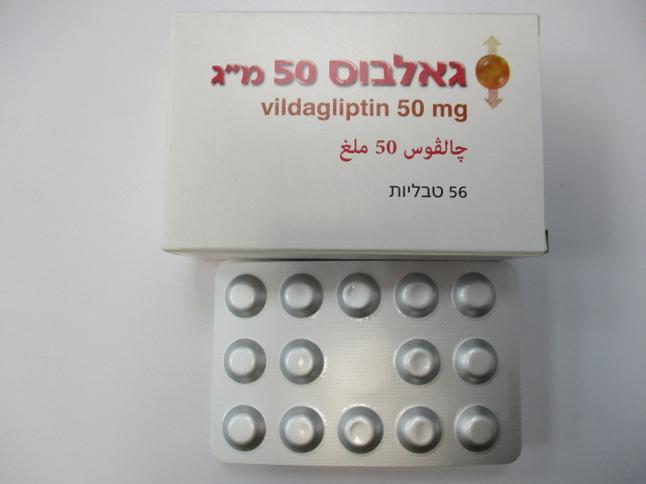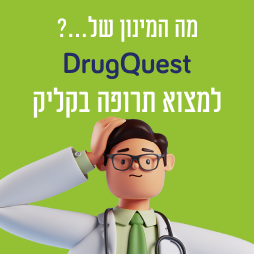Quest for the right Drug

גאלבוס 50 מ"ג GALVUS 50 MG (VILDAGLIPTIN)
תרופה במרשם
תרופה בסל
נרקוטיקה
ציטוטוקסיקה
צורת מתן:
פומי : PER OS
צורת מינון:
טבליה : TABLETS
עלון לרופא
מינוניםPosology התוויות
Indications תופעות לוואי
Adverse reactions התוויות נגד
Contraindications אינטראקציות
Interactions מינון יתר
Overdose הריון/הנקה
Pregnancy & Lactation אוכלוסיות מיוחדות
Special populations תכונות פרמקולוגיות
Pharmacological properties מידע רוקחי
Pharmaceutical particulars אזהרת שימוש
Special Warning עלון לרופא
Physicians Leaflet
Adverse reactions : תופעות לוואי
4.8 Undesirable effects Summary of the safety profile Safety data were obtained from a total of 5 451 patients exposed to vildagliptin at a daily dose of 100 mg (50 mg twice daily) in randomised double-blind placebo-controlled trials of at least 12 weeks duration. Of these patients, 4 622 patients received vildagliptin as monotherapy and 829 patients received placebo. GAL API SEP22 V4 4 EU SmPC 07.2022 The majority of adverse reactions in these trials were mild and transient, not requiring treatment discontinuations. No association was found between adverse reactions and age, ethnicity, duration of exposure or daily dose. Hypoglycaemia has been reported in patients receiving vildagliptin concomitantly with sulphonylurea and insulin. The risk of acute pancreatitis has been reported with the use of vildagliptin (see section 4.4). Tabulated list of adverse reactions Adverse reactions reported in patients who received Galvus in double-blind studies as monotherapy and add-on therapies are listed below for each indication by system organ class and absolute frequency. Frequencies are defined as very common (≥1/10), common (≥1/100 to <1/10), uncommon (≥1/1,000 to <1/100), rare (≥1/10,000 to <1/1,000), very rare (<1/10,000), not known (cannot be estimated from the available data). Within each frequency grouping, adverse reactions are presented in order of decreasing seriousness. Table 1 Adverse reactions reported in patients who received vildagliptin as monotherapy or as add-on therapy in controlled clinical studies and in post-marketing experience System organ class - adverse reaction Frequency Infections and infestations Nasopharyngitis Very common Upper respiratory tract infection Common Metabolism and nutrition disorders Hypoglycaemia Uncommon Nervous system disorders Dizziness Common Headache Common Tremor Common Eye disorders Vision blurred Common Gastrointestinal disorders Constipation Common Nausea Common Gastro-oesophageal reflux disease Common Diarrhoea Common Abdominal pain, including upper Common Vomiting Common Flatulence Uncommon Pancreatitis Rare Hepatobiliary disorders Hepatitis Not known* Skin and subcutaneous tissue disorders Hyperhidrosis Common Rash Common Pruritis Common Dermatitis Common Urticaria Uncommon Exfoliative and bullous skin lesions, including bullous pemphigoid Not known* Cutaneous vasculitis Not known* Musculoskeletal and connective tissue disorders Arthralgia Common Myalgia Common Reproductive system and breast disorders Erectile dysfunction Uncommon General disorders and administration site conditions GAL API SEP22 V4 5 EU SmPC 07.2022 Asthenia Common Oedema peripheral Common Fatigue Uncommon Chills Uncommon Investigations Abnormal liver function tests Uncommon Weight increase Uncommon * Based on post-marketing experience. Description of selected adverse reactions Hepatic impairment Rare cases of hepatic dysfunction (including hepatitis) have been reported. In these cases, the patients were generally asymptomatic without clinical sequelae and liver function returned to normal after discontinuation of treatment. In data from controlled monotherapy and add-on therapy trials of up to 24 weeks in duration, the incidence of ALT or AST elevations 3x ULN (classified as present on at least 2 consecutive measurements or at the final on-treatment visit) was 0.2%, 0.3% and 0.2% for vildagliptin 50 mg once daily, vildagliptin 50 mg twice daily and all comparators, respectively. These elevations in transaminases were generally asymptomatic, non-progressive in nature and not associated with cholestasis or jaundice. Angioedema Rare cases of angioedema have been reported on vildagliptin at a similar rate to controls. A greater proportion of cases were reported when vildagliptin was administered in combination with an angiotensin converting enzyme inhibitor (ACE-Inhibitor). The majority of events were mild in severity and resolved with ongoing vildagliptin treatment. Hypoglycaemia Hypoglycaemia was uncommon when vildagliptin (0.4%) was used as monotherapy in comparative controlled monotherapy studies with an active comparator or placebo (0.2%). No severe or serious events of hypoglycaemia were reported. When used as add-on to metformin, hypoglycaemia occurred in 1% of vildagliptin-treated patients and in 0.4% of placebo-treated patients. When pioglitazone was added, hypoglycaemia occurred in 0.6% of vildagliptin-treated patients and in 1.9% of placebo-treated patients. When sulphonylurea was added, hypoglycaemia occurred in 1.2% of vildagliptin treated patients and in 0.6% of placebo-treated patients. When sulphonylurea and metformin were added, hypoglycaemia occurred in 5.1% of vildagliptin treated patients and in 1.9% of placebo treated patients. In patients taking vildagliptin in combination with insulin, the incidence of hypoglycaemia was 14% for vildagliptin and 16% for placebo. Reporting of suspected adverse reactions Reporting suspected adverse reactions after authorisation of the medicinal product is important. It allows continued monitoring of the benefit/risk balance of the medicinal product. Any suspected adverse events should be reported to the Ministry of Health according to the National Regulation by using an online form https://sideeffects.health.gov.il/

שימוש לפי פנקס קופ''ח כללית 1994
לא צוין
תאריך הכללה מקורי בסל
לא צוין
הגבלות
לא צוין
מידע נוסף
עלון מידע לצרכן
18.04.21 - עלון לצרכן אנגלית 18.04.21 - עלון לצרכן עברית 18.04.21 - עלון לצרכן ערבית 11.10.22 - עלון לצרכן עברית 09.01.23 - עלון לצרכן אנגלית 09.01.23 - עלון לצרכן עברית 09.01.23 - עלון לצרכן ערבית 22.02.15 - החמרה לעלון 14.10.15 - החמרה לעלון 03.08.20 - החמרה לעלון 11.10.22 - החמרה לעלוןלתרופה במאגר משרד הבריאות
גאלבוס 50 מ"ג